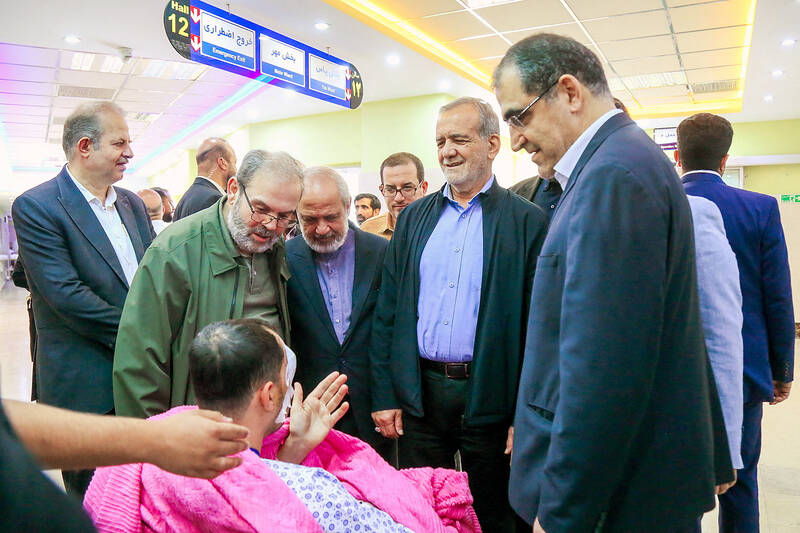For almost a week, ophthalmologist Elias Jaradeh has worked around the clock, trying to keep up with the flood of patients whose eyes were injured when pagers and walkie-talkies exploded across Lebanon.
He has lost track of how many eye operations he has performed in multiple hospitals, surviving on two hours of sleep before starting the next operation. He has managed to save some patients’ sight, but many would never see again.
“There is no doubt that what happened was extremely tragic, when you see this overwhelming number of people with eye injures arriving at the same time to the hospital, most of them young men, but also children and young women,” he said at a Beirut hospital, struggling to hold back tears.

Photo: Iranian Presidency / WANA via Reuters
Lebanese hospitals and medics were inundated after thousands of hand-held devices belonging to the Hezbollah militant group detonated simultaneously on Tuesday and Wednesday last week, killing at least 39 people. About 3,000 more were wounded, some with life-altering disabilities.
Israel is widely believed to have been behind the attack, although it has neither confirmed nor denied its involvement.
Although the explosions appear to have targeted Hezbollah fighters, many of the victims were civilians, and many of those hurt in the attack suffered injuries to their hands, face and eyes because the devices received messages just before they detonated, so they were looking at the devices as they exploded.
Authorities have not said how many people lost their eyes.
Veteran and hardened Lebanese eye doctors who have dealt with the aftermath of multiple wars, civil unrest and explosions, said they have never seen anything like it.
Jaradeh, who is also a lawmaker representing south Lebanon as a reformist, said most of the patients sent to his hospital, which specializes in ophthalmology, were young people who had significant damage to one or both eyes. He said he found plastic and metal shrapnel inside some of their eyes.
Four years ago, a powerful blast tore through Beirut’s port, killing more than 200 people and wounding more than 6,000. That explosion, caused by the detonation of hundreds of tonnes of ammonium nitrates that had been stored unsafely at a port warehouse, blew out windows and doors for kilometers around and sent cascades of glass shards pouring onto the streets, leading to horrific injuries.
Jaradeh also treated people hurt in the port explosion, but his experience with those wounded by the exploding pagers and walkie-talkies has been so much more intense because of the sheer volume of people with eye injuries.
“Containing the shock after the Beirut port blast was, I believe, 48 hours, while we haven’t reached the period of containing the shock now,” Jaradeh said.
Jaradeh said he found it hard to dissociate his job as a doctor from his emotions in the operating theater.
“No matter what they taught you [in medical school] about distancing yourself, I think in a situation like this, it is very hard when you see the sheer numbers of wounded. This is linked to a war on Lebanon and war on humanity,” Jaradeh said.

POLITICAL PRISONERS VS DEPORTEES: Venezuela’s prosecutor’s office slammed the call by El Salvador’s leader, accusing him of crimes against humanity Salvadoran President Nayib Bukele on Sunday proposed carrying out a prisoner swap with Venezuela, suggesting he would exchange Venezuelan deportees from the US his government has kept imprisoned for what he called “political prisoners” in Venezuela. In a post on X, directed at Venezuelan President Nicolas Maduro, Bukele listed off a number of family members of high-level opposition figures in Venezuela, journalists and activists detained during the South American government’s electoral crackdown last year. “The only reason they are imprisoned is for having opposed you and your electoral fraud,” he wrote to Maduro. “However, I want to propose a humanitarian agreement that

ECONOMIC WORRIES: The ruling PAP faces voters amid concerns that the city-state faces the possibility of a recession and job losses amid Washington’s tariffs Singapore yesterday finalized contestants for its general election on Saturday next week, with the ruling People’s Action Party (PAP) fielding 32 new candidates in the biggest refresh of the party that has ruled the city-state since independence in 1965. The move follows a pledge by Singaporean Prime Minister Lawrence Wong (黃循財), who took office last year and assumed the PAP leadership, to “bring in new blood, new ideas and new energy” to steer the country of 6 million people. His latest shake-up beats that of predecessors Lee Hsien Loong (李顯龍) and Goh Chok Tong (吳作棟), who replaced 24 and 11 politicians respectively

Young women standing idly around a park in Tokyo’s west suggest that a giant statue of Godzilla is not the only attraction for a record number of foreign tourists. Their faces lit by the cold glow of their phones, the women lining Okubo Park are evidence that sex tourism has developed as a dark flipside to the bustling Kabukicho nightlife district. Increasing numbers of foreign men are flocking to the area after seeing videos on social media. One of the women said that the area near Kabukicho, where Godzilla rumbles and belches smoke atop a cinema, has become a “real

‘POINT OF NO RETURN’: The Caribbean nation needs increased international funding and support for a multinational force to help police tackle expanding gang violence The top UN official in Haiti on Monday sounded an alarm to the UN Security Council that escalating gang violence is liable to lead the Caribbean nation to “a point of no return.” Special Representative of the UN Secretary-General for Haiti Maria Isabel Salvador said that “Haiti could face total chaos” without increased funding and support for the operation of the Kenya-led multinational force helping Haiti’s police to tackle the gangs’ expanding violence into areas beyond the capital, Port-Au-Prince. Most recently, gangs seized the city of Mirebalais in central Haiti, and during the attack more than 500 prisoners were freed, she said.